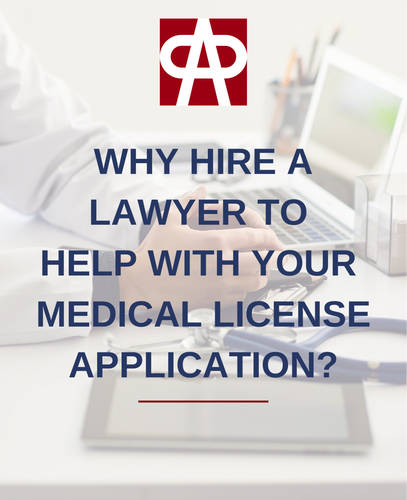
You made it through multiple years of undergraduate and medical school, countless exams, residency, and other requirements to become a licensed physician. Now it is time to apply for your license to practice medicine. When it finally becomes time to apply for your medical license, the process can become overwhelmingly chaotic with many deadlines to meet and many documents to submit. In addition, if you have any past issues that require additional disclosure, you will need proper documentation and explanations for that as well.
If this process seems convoluted and cumbersome to you, you aren’t alone. Read on to find out more about how an attorney experienced with state medical boards and licensing issues can help you in your medical license application process. When in doubt, it is beneficial to seek the advice of a lawyer who can help ensure your application and any supplemental responses don’t create a problem down the road.
Applying for your medical license can be cumbersome, confusing, and timeconsuming. A knowledgeable and experienced attorney in physician licensure will help ensure that your physician license application has all the necessary components.
An attorney will be able to present any potential issues in the light most favorable to you and will assist you in supplying the board with any additional materials or information requested to proceed in the application process.
Another reason to hire an attorney to assist you with your licensure process is that your attorney will be able to answer any questions you have during the process, such as questions you have about the specific documents needed for your licensure application. One of the main reasons that license applications are denied or delayed is for lack of documentation or failing to provide comprehensive responses to application questions. An attorney who is knowledgeable in the arena of physician licensure will be able to assist you in gathering all documentation to submit it properly to the board. An attorney will also ensure that your licensure application components are all submitted by the guidelines set by your state’s medical licensing board.
In sum, an attorney experienced in credentialing matters can help you mitigate any circumstances that would prevent license denial and assist you throughout the entire medical licensure application process.
How long does the medical license application process take?
The American Medical Association states that physicians should plan for the process to take at least 60 days. In some states, the wait could be as long as six months. The process may be longer or shorter depending on how straightforward your application is and your specific circumstances. Although every state and particular situation is different, failing to truthfully disclose pertinent information can often result in delayed processing of your application. As a result, it is always better to apply for your medical license well in advance of starting any job requiring completion of your licensure application.
What are common licensure issues?
Some common licensure issues include not submitting all of the necessary requested information, missing deadlines, not allowing adequate time for processing, and not fully disclosing your background to your state’s licensing and/or medical board.
A knowledgeable and experienced attorney in physician licensure will ensure that all of your materials are submitted on time to the proper agency, which will expedite your results.
What are some examples of unprofessional conduct?
While each state has its own Medical Practice Act that outlines and defines unprofessional conduct, there are some common acts that all states consider to be unprofessional conduct worthy enough of disclosure. Some examples of unprofessional conduct that could hold up your licensure application or, after licensure, could subject you to “board action” (disciplinary actions), include:
If the above-named or similar issues are something that you have to disclose to the medical licensing board in your state, it may be worth it to hire an attorney to preemptively prepare your application in the best light possible.
If you have any concerns about something in your history, your attorney will work with you to navigate this issue to present your medical license application in a way that is favorable to you. An attorney who is knowledgeable in navigating medical licensing issues could potentially be the difference between a denial of your application and approval of your medical license.
There are many potential issues with licensure denial. After all the years of your hard work towards becoming a licensed attending physician, you may be forced to stop practicing medicine in any capacity if your licensure application is denied.
One common way for applications to get denied is not paying attention to your state’s specific rules for when you must apply for a license while in postmedical school training. For example, in some states, you must apply 90 days after you start your medical training in a residency program through the Accreditation Council for Graduate Medical Education (ACGME). If you do not apply at the end of the 90-day period when you start your training and you do not receive your license, you must cease all clinical services at the end of 90 days.
The best way to avoid potential denial of your medical license is to retain a knowledgeable and experienced attorney in medical licensing. They will be able to assist you from the very start of your application and, in the rare case that your license is denied, help you through the appeal process.
To speak to an attorney about assisting you in the medical licensure process, contact Athan Law at (509) 215-4679.
Disclaimer: The information provided on this article is for educational purposes only and is not intended as legal advice. Every case or situation is unique, and you should consult with a licensed attorney before taking any action. No attorney-client relationship is formed by downloading or reading this article.
Posted February 10, 2023
